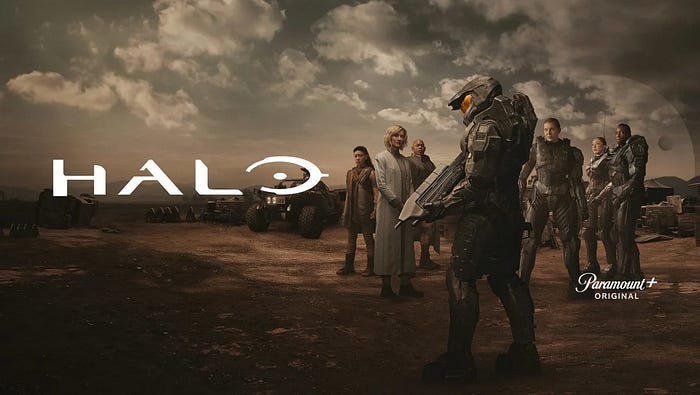A review from a non-gamer.
 |
| The image above is property of Paramount+. |
Let me start by saying that I’m not interested in video games. The last time I played them was on a Windows 95 PC in 1998. So I don’t know what this series is based on. I’m talking about it as a TV-watcher who loves science fiction.
It is a military science fiction/space opera series, set in a distant future, full of beautiful spaceships, planets with the most disparate characteristics and an enemy alien species with which humanity is at war. And one of the most powerful tools of war humans have at their disposal is the Spartans, enhanced and emotionless human warriors. Among these is the protagonist, John-117, known by the nom de guerre Master Chief.
I won’t tell you anything else about the plot because I think it’s better to discover it step by step over the course of the nine episodes of the series. Rather, I’ll just clarify that I’m only referring to the first season. In fact, upon seeing it, you immediately realise that all the narrative threads do not have enough space to be concluded. It almost seems like a great introduction to the rest of the seasons. In any case, there are some aspects that are clarified. Furthermore, I found the twist ending (almost a cliffhanger) very satisfying. With such a complex narrative structure, there was the risk that certain threads would be closed too hastily, but, all things considered, this was not the case.
The plot
contains a whole series of elements that are particularly congenial to me.
One of these is undoubtedly the fact of having a protagonist who does not know his own identity at all, and the revelation of the latter is central to the series.
Another interesting element is the use of artificial intelligence (Cortana), which was conceived as a tool for control, but which at a certain point asks itself questions about whether it is right to follow the orders. Here, the AI, which at the beginning has a disturbing and apparently negative connotation, then turns out to be a positive character.
Then there is the presence of a deeply ambiguous character (even more than the AI) in the hands of the supervillains (the aliens), who has a particular evolution. It’s a shame that this character has to fall victim to the usual ruthless karma of American productions, in which repentance is never enough to redeem oneself.
But aliens aren’t the only bad guys. They are in fact only the supervillains, that is, those who are just bad, without any apparent reason. Even among humans are some decidedly negative characters, such as Dr. Halsey, who is head of the Spartan program. However, in her case, motivations are brought to light which, however excessive, have an intrinsic logic that provides the character with a certain depth.
Finally, the special effects are for the most part truly remarkable. The aliens reminded me of several creatures seen in the Star Wars saga. Perhaps only the setting of the battle in the last episode is a little poor.
The only thing that puzzled me was the location of the device that suppresses the Spartans’ emotions: in the lower back. Meh!
Overall, I enjoyed watching this series. The story is intriguing and well-developed. And at the end of the viewing, the curiosity remains, and you are looking forward to diving into the second season as soon as possible.
“Halo” is available on Paramount+.

No comments:
Post a Comment